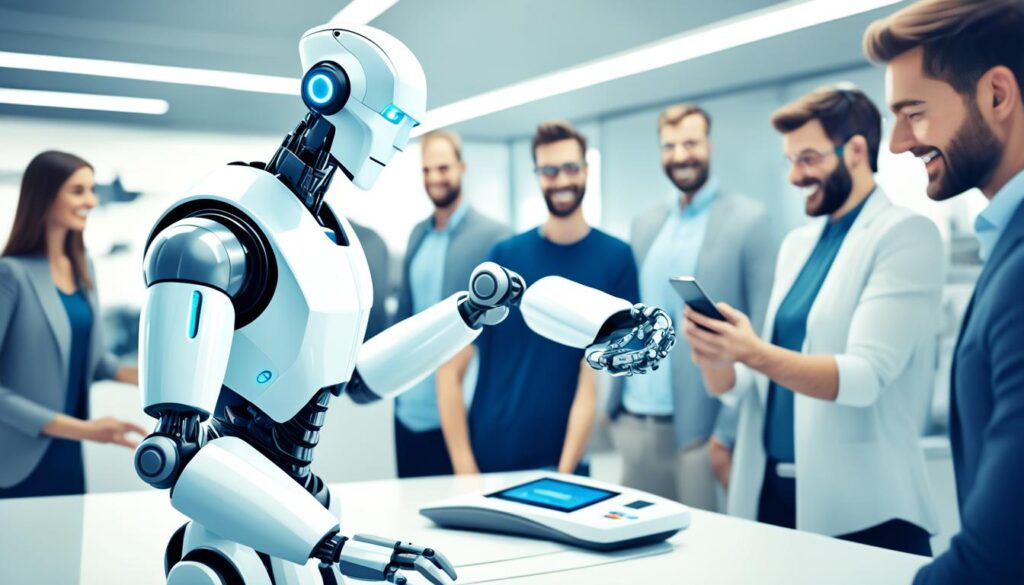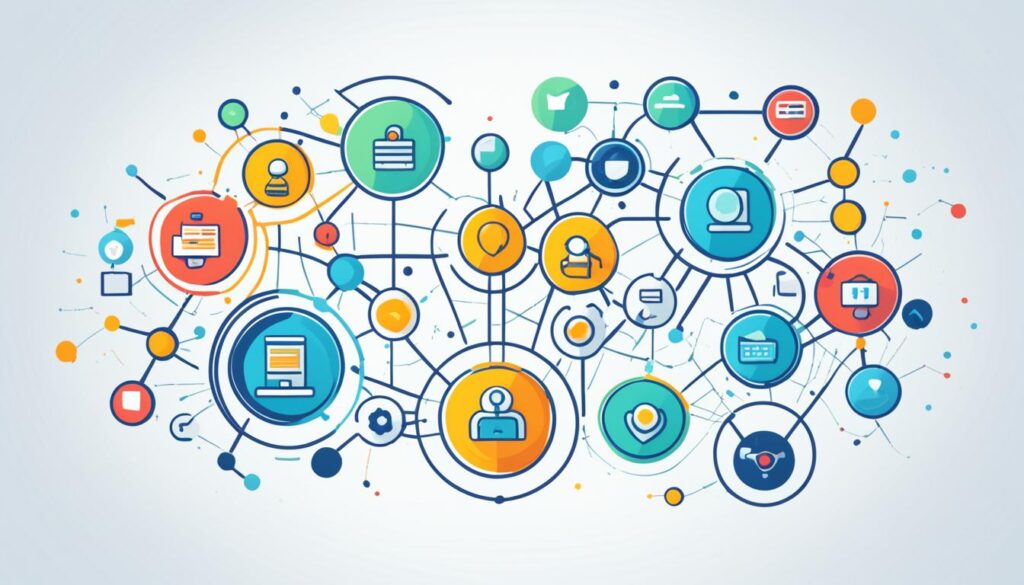In today’s fast-changing digital world, customer service is key to standing out. Companies are always looking for new ways to make their helpdesk better and support customers well. AI-powered helpdesk automation is a big change that’s changing how we handle customer service.
This guide looks at the top AI solutions for helpdesk automation. We see how these advanced technologies are changing customer support and service desk work. We cover everything from conversational AI and natural language processing to smart assistants and automated ticketing. These tools and strategies are shaping the future of helpdesk automation.
Key Takeaways
- AI-powered helpdesk automation is changing customer service, making it more efficient and personal.
- Conversational AI and natural language processing are closing the gap between customers and service agents.
- Intelligent assistants and automated ticketing are making helpdesk work smoother, cutting down response times and costs.
- Chatbots and virtual agents lead the AI-powered support, offering 24/7 help and self-service options.
- Adding AI-powered helpdesk solutions needs a careful plan, including training and ongoing improvement.
Embracing the Future of Customer Support
The digital world is always changing, and businesses are seeing how AI-powered helpdesk automation changes customer support. They use conversational AI and natural language processing to give customers a better experience. This makes customers happier.
Chatbots are changing the game by handling simple questions and letting human agents work on harder tasks. These AI helpers give quick answers, are always there, and offer solutions that fit what customers need. This makes support faster and easier.
Natural language processing lets chatbots really get what customers are saying. They can give answers that really solve the problem. This new tech is changing how companies talk to customers, making support better and more satisfying.
Looking ahead, companies that use AI-powered helpdesk automation will be ahead. These new tools help increase customer loyalty, make work more efficient, and lead to success in a fast-changing market.
“The future of customer support lies in the seamless integration of AI-powered technologies that can anticipate and respond to customer needs with unparalleled efficiency and personalization.”
What is AI-Powered Helpdesk Automation?
In today’s fast-paced customer support world, AI-powered helpdesk automation is changing how businesses talk to their clients. This new tech uses conversational AI and natural language processing to make support faster and better. It makes the customer’s experience smoother.
Conversational AI: The Driving Force
Conversational AI is key to AI-powered helpdesk automation. It lets us make smart chatbots and virtual agents. These AI helpers can talk like humans, answering customer questions very well. They use natural language processing to understand and reply to customers, making support more personal and quick.
Natural Language Processing: Bridging the Gap
Natural language processing (NLP) is crucial for AI-powered helpdesk automation. It helps systems understand and analyze what customers say. With NLP, AI assistants can get the meaning behind customer messages, answering them fast and right. It makes customer support more natural and quick.
Conversational AI and NLP together are changing how businesses talk to customers. As this tech gets better, it’s set to change customer support for the better. It will make support more personal, efficient, and satisfying for everyone.
Benefits of AI-Powered Helpdesk Automation
AI-powered helpdesk automation brings big changes for companies wanting to improve their customer support. It makes customers happier, helps agents work better, and uses resources wisely. It also lets customers help themselves easily.
AI helps us give automated customer support on a big scale. Smart chatbots quickly answer simple questions. This lets our agents deal with harder issues that need a personal touch. It makes our support better and keeps customers happy because they get help fast and easily.
These self-service solutions let customers handle their support needs by themselves. They can find answers, fix problems, and ask for help without needing an agent. With easy-to-use AI tools, solving common issues is much faster. This means customers stay loyal and keep coming back.
Adding intelligent assistants to our support team makes our agents work better. These AI tools collect important info, suggest answers, and do simple tasks automatically. This lets agents focus on giving top-notch, personal support. This leads to quicker problem solving, more issues fixed on the first try, and happier customers.
“AI-powered helpdesk automation has transformed our customer support operations, empowering our agents to deliver exceptional service and our customers to find solutions quickly and efficiently.”
By using AI in our helpdesk, we start a new chapter in customer support. It brings real benefits that help our business, our team, and our customers a lot.
Best AI for Helpdesk Automation
The market for AI-powered helpdesk automation is growing fast. We’ve found the top tools that are making a big impact. These tools include conversational chatbots and virtual agents. They help make customer support better, work more efficiently, and improve how users feel.
Conversational AI is a key player in this area. It uses natural language processing to talk to customers in a way that feels real. These chatbots can answer a lot of questions, from simple ones to tricky problems, any time of the day.
Virtual agents are also changing the game in helpdesk automation. They can easily keep up with customer chats, find the right info, and give personalized help. They can do many tasks, like setting up meetings or suggesting products, making them very useful for customer support.
Many companies are adding natural language processing to these AI tools. This makes chatbots and virtual agents understand what customers really want. This leads to better and more accurate answers.
So, the best AI for helpdesk automation depends on what your company needs. Look at the features, how well they work, and how they fit with your systems. This way, you can pick the right tool to make your customer support better and make your customers happy.

Chatbots: The Frontline of AI-Powered Support
Chatbots are now leading the way in customer support with AI. They use advanced conversational AI and natural language processing (NLP) to change how businesses talk to customers.
Chatbot Integration and Implementation
Adding chatbots to your support team can change the game for customers. They can handle many types of questions, from simple to complex, making support smooth and quick. Thanks to conversational AI and natural language processing, chatbots talk like humans, giving help that feels personal and right on point.
Chatbots make your support team work better by cutting down on wait times and letting human agents focus on harder issues. They work all the time and can talk to many customers at once, making your automated customer support better for everyone.
For chatbots to work well, they need to be trained to answer questions clearly and with feeling. Using natural language processing tech, they can pick up on what customers mean and give them the right help.
Chatbots work even better when they connect with other tools like ticketing systems and knowledge bases. This makes your AI-powered helpdesk work smoother and better for customers.
As companies look to make customers happier and run more efficiently, chatbots are key in AI-powered support. Using conversational AI and NLP, companies can make customers happier, cut support costs, and do better overall.
Virtual Agents: Intelligent Conversational Assistants
Virtual agents are changing the game in AI-powered helpdesk automation. They’re more than just chatbots. These intelligent conversational assistants use natural language processing and conversational AI to make customer support more personal and engaging.
Virtual agents understand context and keep conversations flowing smoothly. They learn from each interaction to get better at answering questions. This makes them offer support that feels more like talking to a person, with empathy and accuracy.
They’re great at solving complex problems and giving specific solutions. With a huge knowledge base and natural language processing, they get what customers need and give them the right answers.
Virtual agents can also learn what customers like and how they talk. This makes their support more personal. As they chat more, they get better at solving problems quickly and effectively.
Adding virtual agents to helpdesk automation makes things better for customers and support teams. They take care of simple questions, letting human agents handle the tough stuff. This makes everyone happier and more productive.
As we want better and smarter customer support, virtual agents are set to be key players in helpdesk automation. They’re changing how businesses talk to their customers.

Automated Ticketing and Self-Service Solutions
AI-powered helpdesk automation has changed how we handle customer questions. Automated ticketing systems and self-service solutions make support faster and better. They help both companies and customers work together more smoothly.
Streamlining Customer Inquiries
Automated ticketing uses artificial intelligence and natural language processing to quickly sort and send customer questions to the right teams. This means problems get solved faster and customers are happier.
Self-service portals let customers solve their own problems without talking to support agents. These intelligent assistants and AI-powered tools give customers easy access to help and information. They can troubleshoot and even start service requests on their own.
Using automated ticketing and self-service helps companies save time and resources. Agents can focus on harder tasks that need a human touch. This makes the helpdesk work better and lets customers help themselves.
| Feature | Benefit |
|---|---|
| Automated Ticketing | Efficient triage and routing of customer inquiries |
| Self-Service Portals | Empowers customers to find answers and resolve issues independently |
| AI-Powered Assistance | Provides intelligent, on-demand support for customers |
| Streamlined Workflows | Frees up agent time and resources for more complex tasks |
By using automated ticketing and self-service solutions, companies can improve their support. They give customers a smooth and efficient experience that meets their needs.
Intelligent Assistants: The Future of Helpdesk Automation
Intelligent assistants are changing the game in AI-powered helpdesk automation. They offer real-time advice, suggest the best solutions, and can do some tasks on their own. This is making customer support better than ever.
These smart helpers make agents more productive and help solve problems faster. They use AI to understand what customers need and give them tailored advice. This makes support smoother and more efficient.
Intelligent assistants can do simple tasks by themselves, letting agents focus on harder problems. They give quick answers to common questions, cutting down wait times and making customers happier.
They also get better over time by learning from past chats. This means they get more efficient and helpful, making support even better for everyone.
As we all want faster and more personal customer service, intelligent assistants will play a big role. Adding these AI tools to support teams can bring huge gains in productivity and customer happiness.
“Intelligent assistants are the future of helpdesk automation, empowering agents and customers alike with real-time guidance and personalized solutions.”
Overcoming Challenges in AI-Powered Helpdesk Automation
As more companies use best ai for helpdesk automation, they face challenges in setting it up and keeping it running well. It’s important to overcome these issues to make the most of conversational ai, chatbots, and virtual agents. These tools can greatly improve how customers get help.
One big issue is making sure AI systems talk to customers in a natural way. They need to understand and answer different kinds of questions well. It’s also key to tell customers what the AI can and can’t do to set their expectations right.
- Putting AI solutions into current helpdesk systems can be tricky. Companies need to check if everything works well together, including data sharing and process flow. This makes sure support is smooth and effective.
- Keeping customer data safe and private is a big deal. Since customers share personal info, companies must protect it well. This builds trust and follows the law.
- It’s important to keep making AI helpdesk automation better over time. By looking at customer feedback and important numbers, and updating the system, companies can meet changing customer needs and new tech.
By tackling these issues and using smart strategies, companies can use AI-powered helpdesk automation to give top-notch customer support. This can make operations more efficient and help them stand out in a fast-changing market.
“Embracing the challenges of AI-powered helpdesk automation is the key to unlocking its full transformative potential for businesses and customers alike.”
Best Practices for Implementing AI-Powered Helpdesk Solutions
Implementing AI-powered helpdesk solutions needs a strategic plan. It’s important to match the technology with your company’s needs and make sure it fits with your current systems. We’ll share the best ways to make this happen. Also, we’ll talk about the need for ongoing training and improvement to get the most out of your AI-powered helpdesk automation.
Training and Continuous Improvement
Starting with AI-powered helpdesk automation means training is key. Make sure your chatbots, virtual agents, and intelligent assistants know your company’s rules, how things work, and what customer service means. This helps them give correct and steady answers, making automated customer support better.
Keeping your AI-powered helpdesk solution up to date is crucial for success. Keep an eye on how it’s doing, ask for feedback, and look at the data to find ways to get better. This way, your self-service solutions stay useful and meet your customers’ changing needs.
- Make detailed training for your AI-powered helpdesk team. Include product knowledge, customer service tips, and how to talk to people.
- Set up good ways to get feedback from customers and your team. This helps you keep making your AI-powered ticketing and automated customer support better.
- Update your conversational AI models often to make them better at understanding and answering customer questions. Use the newest in natural language processing.
- Encourage a culture of always learning and getting better. Have your team find new ways to use AI-powered helpdesk automation to give great customer service.
By following these best practices, you can make sure your AI-powered helpdesk solutions work well and keep getting better. This approach will help you use conversational AI, chatbots, virtual agents, and other intelligent assistants to the fullest. This will lead to amazing customer service and help your business grow.
Conclusion
AI-powered helpdesk automation is changing how we support customers. It makes service faster, more personal, and efficient. By using conversational AI, natural language processing, and intelligent assistants, we get many benefits. These include better customer satisfaction and more agent productivity.
Looking ahead, staying up-to-date with the best AI solutions for helpdesk automation is key. Chatbots and virtual agents are leading the way in AI support. They work well with automated ticketing and self-service solutions. The growth of intelligent assistants will change helpdesk automation even more, making it more responsive and personal.
By using AI, we can set a new high standard in customer support. This standard is all about being efficient, accurate, and focused on our customers’ needs. As we explore new possibilities, we’re sure AI-powered helpdesk automation will change the game. It will lead us into a future where customer needs are at the center of everything we do.
